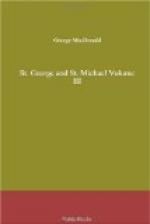And as he shouted he sent Beelzebub, like low-flying bolt from cross-bow, up the steep crown of the bridge, and wedged him in between Oliver and the parapet, just as a second cavalier made a dart for the place. At his horse Beelzebub sprang like a fury, rearing, biting, and striking out with his fore-feet in such manner as quite to make up to his rider for the disadvantage of his low stature. The cavalier’s horse recoiled in terror, rearing also, but snorting and backing and wavering, so that, in his endeavours to avoid the fury of Beelzebub, which was frightful to see, for with ears laid back and gleaming teeth he looked more like a beast of prey, he would but for the crowd behind him have fallen backward down the slope. A bullet from one of Richard’s pistols sent his rider over his tail, the horse fell sideways against that of Mr. Heywood’s antagonist, and the path was for a moment barricaded.
‘Well done, good Beelzebub!’ cried Richard, as he reined him back on to the crest of the bridge.
‘Boy!’ said his father sternly, at the same instant dealing his encumbered opponent a blow on the head-piece which tumbled him also from his horse, ’is the sacred hour of victory a time to sully with profane and foolish jests? I little thought to hear such words at my side—not to say from the mouth of my own son!’
‘Pardon me, father; I praised my horse,’ said Richard. ’I think not he ever had praise before, but it cannot corrupt him, for he is such an ill-conditioned brute that they that named him did name him Beelzebub: Now that he hath once done well, who knoweth but it may cease to fit him!’
‘I am glad thy foolish words were so harmless,’ returned Mr. Heywood, smiling. ’In my ears they sounded so evil that I could ill accept their testimony.—Verily the animal is marvellous ill-favoured, but, as thou sayest, he hath done well, and the first return we make him shall be to give him another name. The less man or horse hath to do with Satan the better, for what is he but the arch-foe of the truth?’
While they spoke, they kept a keen watch on the enemy—who could not get near to attack them, save with a few pistol-bullets, mostly wide-shot—for both horses were down, and their riders helpless if not slain.
‘What shall we call him then, father?’ asked Richard.
‘He is amazing like a huge rat!’ said his father. ’Let us henceforth call him Bishop.’
‘Wherefore Bishop and not Beelzebub, sir?’ inquired Richard.
Mr. Heywood laughed, but ere he could reply, a large troop of horsemen appeared at the top of the street. Glancing then behind in some anxiety, they saw to their relief that the pikemen had now formed themselves into a hollow square at the foot of the bridge, prepared to receive cavalry. They turned therefore, and, passing through them, rode to find their regiment.
From that day Bishop, notwithstanding his faults many and grievous, was regarded with respect by both father and son, Richard vowing never to mount another, let laugh who would, so long as the brute lived and he had not recovered Lady.




